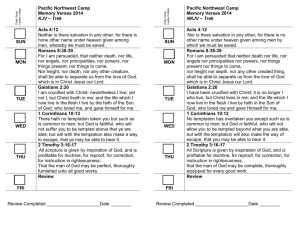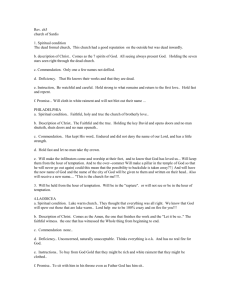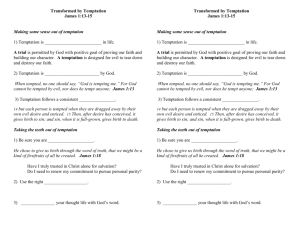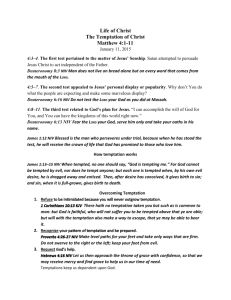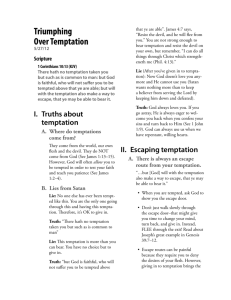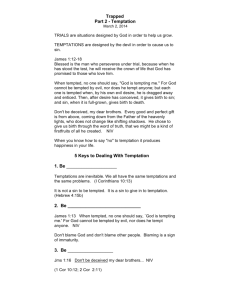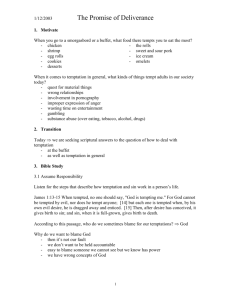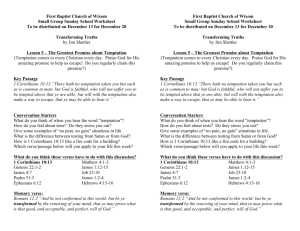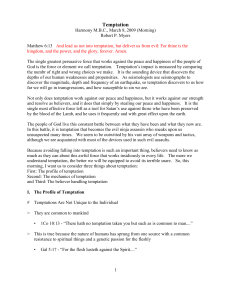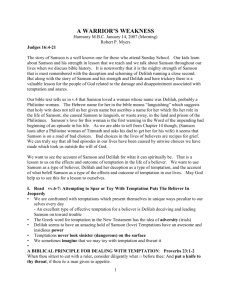August 2, 2015 - St. Thomas Anglican Church in
advertisement
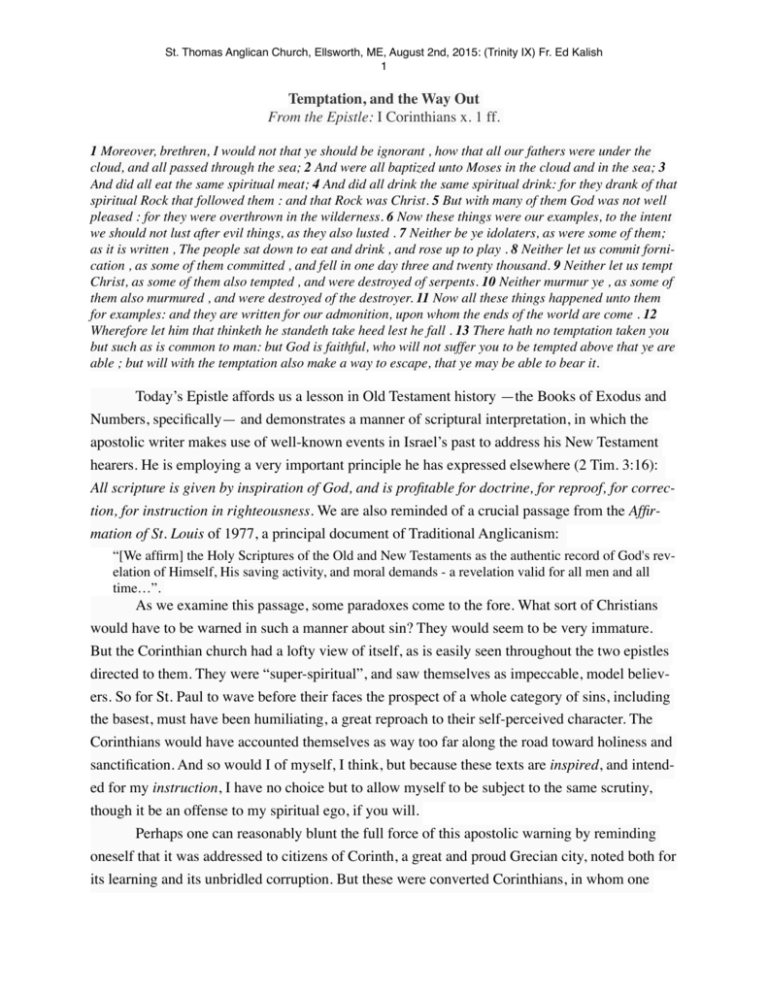
St. Thomas Anglican Church, Ellsworth, ME, August 2nd, 2015: (Trinity IX) Fr. Ed Kalish 1 Temptation, and the Way Out From the Epistle: I Corinthians x. 1 ff. 1 Moreover, brethren, I would not that ye should be ignorant , how that all our fathers were under the cloud, and all passed through the sea; 2 And were all baptized unto Moses in the cloud and in the sea; 3 And did all eat the same spiritual meat; 4 And did all drink the same spiritual drink: for they drank of that spiritual Rock that followed them : and that Rock was Christ. 5 But with many of them God was not well pleased : for they were overthrown in the wilderness. 6 Now these things were our examples, to the intent we should not lust after evil things, as they also lusted . 7 Neither be ye idolaters, as were some of them; as it is written , The people sat down to eat and drink , and rose up to play . 8 Neither let us commit fornication , as some of them committed , and fell in one day three and twenty thousand. 9 Neither let us tempt Christ, as some of them also tempted , and were destroyed of serpents. 10 Neither murmur ye , as some of them also murmured , and were destroyed of the destroyer. 11 Now all these things happened unto them for examples: and they are written for our admonition, upon whom the ends of the world are come . 12 Wherefore let him that thinketh he standeth take heed lest he fall . 13 There hath no temptation taken you but such as is common to man: but God is faithful, who will not suffer you to be tempted above that ye are able ; but will with the temptation also make a way to escape, that ye may be able to bear it. Today’s Epistle affords us a lesson in Old Testament history —the Books of Exodus and Numbers, specifically— and demonstrates a manner of scriptural interpretation, in which the apostolic writer makes use of well-known events in Israel’s past to address his New Testament hearers. He is employing a very important principle he has expressed elsewhere (2 Tim. 3:16): All scripture is given by inspiration of God, and is profitable for doctrine, for reproof, for correction, for instruction in righteousness. We are also reminded of a crucial passage from the Affirmation of St. Louis of 1977, a principal document of Traditional Anglicanism: “[We affirm] the Holy Scriptures of the Old and New Testaments as the authentic record of God's revelation of Himself, His saving activity, and moral demands - a revelation valid for all men and all time…”. As we examine this passage, some paradoxes come to the fore. What sort of Christians would have to be warned in such a manner about sin? They would seem to be very immature. But the Corinthian church had a lofty view of itself, as is easily seen throughout the two epistles directed to them. They were “super-spiritual”, and saw themselves as impeccable, model believers. So for St. Paul to wave before their faces the prospect of a whole category of sins, including the basest, must have been humiliating, a great reproach to their self-perceived character. The Corinthians would have accounted themselves as way too far along the road toward holiness and sanctification. And so would I of myself, I think, but because these texts are inspired, and intended for my instruction, I have no choice but to allow myself to be subject to the same scrutiny, though it be an offense to my spiritual ego, if you will. Perhaps one can reasonably blunt the full force of this apostolic warning by reminding oneself that it was addressed to citizens of Corinth, a great and proud Grecian city, noted both for its learning and its unbridled corruption. But these were converted Corinthians, in whom one St. Thomas Anglican Church, Ellsworth, ME, August 2nd, 2015: (Trinity IX) Fr. Ed Kalish 2 would have expected to see significant evidences of faith in Christ. And an even more troubling question arises: can we conclude that the reality of the condition of that ancient church really is so much different from the church of our day? The apostle returns to a very embarrassing season in the history of Israel, when divine love was blatantly and consistently met with rebellion and insolence of almost breathtaking proportions. Just as believers today are baptized into Christ, the Israelites had been wholly taken under the cloud of God’s protective leadership and parenthood, supervised by the wise hand of Moses, baptized unto him. Do you see how the terminology of conversion is employed here? They ate and drank of God’s provision, just as we do through Holy Communion. But what is their behavior is response? Now comes the heat! They lusted after evil things, they became idolaters, who sat down to eat and drink , and rose up to play. They committed fornication, they tempted Christ, and they murmured. This is an extraordinary list! Furthermore, divine discipline of the severest sort, God’s displeasure with these sins, is described: many of them were overthrown in the wilderness, destroyed by serpents, and destroyed by angels. St. Paul now aims the full force of these chaotic accounts, this utterly inappropriate answer to God’s unconditional love so clearly expressed, directly at the Church: Now all these things happened unto them for examples: and they are written for our admonition, upon whom the ends of the world are come. Surely if this statement applied two millennia ago to the Corinthian church, it must do so far more to us, today. We must always be willing to be subject to elementary lessons, time and time again. We are children, after all, in a long process of maturation. And so to be warned even against the grosser sins among St. Paul’s list will certainly do us more good than bad. We are, after all, in a Corinthian culture, one that can hardly esteem itself highly enough on one hand, and on the other, immerse itself gladly, almost without conscience, in the satisfaction of every carnal desire. Does this affect the church? Certainly. The images surround us everywhere, even if we are nonparticipants. And we welcome the images into our homes, even paying for the service, and in that sense, afford them tacit approval. But even if we can safely exempt ourselves from the worst of the Israelites’ transgressions, let’s focus on two others: tempting Christ, and murmuring [NIV: grumbling]. Tempting here is a King James-ism that is much more satisfactorily translated as testing: they tested the Lord. The incident is found in Numbers 21. The judgment was fiery serpents which bit the people (Nu. 21:6). Note for a moment that the word serpent, the identical term used for the Tempter in the Garden of Eden, carries with it the sense of “whispering” or “hissing”. How does one tempt the Lord? Clearly through consistent mistrust of His intentions, disbelief in His power… through faithlessness. The murmuring is part of an incredible chapter, Numbers 16, and is the St. Thomas Anglican Church, Ellsworth, ME, August 2nd, 2015: (Trinity IX) Fr. Ed Kalish 3 climax of an incident of flagrant defiance of Moses’ God-given authority. The people murmured against a divine judgment on rebellion that they all had just witnessed. The Hebrew for murmur means “to plant their feet permanently” in obstinacy. The Greek word implies secret complaint, and —one can certainly imagine— whispering. Could one suggest that the Tempter softly and subtly urges God’s people to find fault with both God’s will and His established leadership? Wherefore let him that thinketh he standeth take heed lest he fall. This is the gravest of St. Paul’s words to us. It can be paraphrased thus: “If I imagine myself to be beyond reproach, to have sufficiently matured so that I can successfully avoid temptation, to be a person of such rationality and self-control that I can assure myself that I am beyond moral or spiritual mishap, it is then that I ought to take heed lest I fall.” No doubt the apostle included himself among this number. All of this serves as a tremendous corrective to the temptation to live our Christian lives carelessly and unwisely, forgetting our gullibility, our inherent weakness, and the power and nature of our spiritual foes. Thank God that our Book of Common Prayer is filled with Collects that were written intentionally to remind us of our true state! May I affirm that if the grosser sins are easier to catch through self-monitoring, the more subtle ones are not. We easily lapse into tempting Christ, and murmuring. The only antidote is humility, handing out the benefit of the doubt to one another in very large measure, and remembering, as 1 Corinthians 13 so beautifully puts it, that love Beareth all things, believeth all things, hopeth all things, endureth all things. [It] never faileth… (vv. 7, 8a). Following this barrage of admonitions, comes one of the loveliest promises in all of Scripture: There hath no temptation taken you but such as is common to man: but God is faithful, who will not suffer you to be tempted above that ye are able ; but will with the temptation also make a way to escape, that ye may be able to bear it. We need to go over these words closely, as they are very important to us, after the drubbing we’ve just been through. There hath no temptation taken you but such as is common to man… : “You are not alone in your trials and your tests. You have fallen prey to a host of sins of attitude, of habit, of word and deed, and have despaired of ever overcoming them. But so have I, and even the same ones, though their manifestation may be different, because none of us is identical.” The point here is that our lot, even at its very worst, is a shared one, and as long as we’re not content to remain in our sin, there is deliverance from it. When? Every time. Where? Through the means God will provide. How do we know? Because God is faithful, who will not suffer you to be tempted above that ye are able ; but will with the temptation also make a way to escape, that ye may be able to bear it. Hold on to this promise as if it were the only handhold preventing the worst of falls. St. Thomas Anglican Church, Ellsworth, ME, August 2nd, 2015: (Trinity IX) Fr. Ed Kalish 4 What can I safely conclude from this promise? I cannot escape temptations. They are everywhere. Outdoors and behind closed doors. In public and in private. And in a time of lawlessness, they are multiplied. It’s no use pretending that it’s different, or being sentimental about some other, kindlier age. God surely delivers us not into temptation, in response to that earnest prayer we regularly offer to Him. We regularly walk into them, however… willingly, inadvertently, and merely out of human frailty and weakness, or weariness and discouragement. Our free will remains firmly in place. But our trials are carefully overseen by God, who will with the temptation also make a way to escape, that ye may be able to bear it. Herein again comes the matter of choice. I am taken [Thayer: “to seize, lay hold of, apprehend”] by a temptation. But I must be willing to make another choice: that of the divinely provided way of escape. Can I see it in the midst of the fires of battle? I must look for it. It may even seem a long time coming, but it will come. It is there. I feel a bit indignant that I’ve got to be brought back to spiritual kindergarten to be reminded once again of how helpless I am, and how prone to the rashness of infancy. But I also feel much the better for it! In the Name of the Father, and of the Son, and of the Holy Ghost. Amen.
